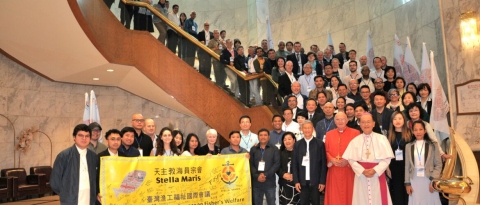
Maryknoll Fr. Joy Tajonera served as the lead organizer and host of the three-day International Conference on Fisher’s Welfare in the Chinese city of Taichung this past May.
More than 130 people from around the world participated in the three-day International Conference on Fisher’s Welfare, traveling to the Chinese city of Taichung from United Kingdom, Ireland, Scotland, USA, Canada, Italy, South Africa, Mauritius, Australia, New Zealand, Indonesia, Thailand, Myanmar, Cambodia, Philippines, Korea, Japan.
To formally open the conference, Maryknoll Fr. Joy Tajonera, Director of Stella Maris-Taiwan, China, emphasized that this event was organized to create an opportunity for those working to make a difference for the welfare of fishers to listen, share, and to dialogue together. Stella Maris is the Catholic Church’s Apostolate of the Sea, which serves people who live, work, or have a connection to the sea, commonly known as fishers.
Cardinal Stephen Brislin, archbishop of Cape Town since 2010, in his address to the conference, characterized the shared mission of the participants as “to see workers at sea not as commodities but rather as individual persons made in the image and likeness of God who strive for agency over their own lives, the means to support their families and themselves with dignity.”
A Pulitzer Prize-winning investigative report by The Associated Press in 2016 found that some seafood, caught and processed by trapped and enslaved workers mostly from Myanmar and Cambodia on boats off the coast of Thailand, was shipped to the United States for sale at supermarkets and pet food stores.
The AP report includes details of what workers endure at sea: 18 to 20–hour workdays, seven days a week; hazardous and life-threatening conditions; inadequate food and blatant disregard for their basic medical needs and injuries. Employers routinely beat and torture workers to force compliance. Some workers are held at sea for years on large fishing vessels because of a lack of regulation. On land, women and even children working in the seafood processing and canning facilities are subjected to long hours, unsafe conditions, physical abuse and neglect of injuries.
At the conference in May, labor union leaders from Indonesia spoke about their efforts to protect fishers’ human rights and labor rights in that country. In addition, a seafood campaign organizer with the organization Global Labor Justice described his work to protect fishers’ right to access Wifi and health care while at sea. An active fisher named Hadi, described his personal experience of a boss withholding access to Wifi, essentially cutting off the fishers’ communication with the outside world, and blocking the fishers’ access to medical care when sick or injured, in an attempt to extort more work from them in return for access to these essential services.
The impact of environmental destruction and climate change on fishers was also addressed during a presentation by Dr. Jessica Sparks of Tufts University. Stress from a changing ocean can decrease fish stock productivity, which is the number of fish that are born and survive to adulthood in a population. Reduced productivity can cause ripple effects in the ecosystem and lower the number of fish that can be caught, forcing fishers to work longer hours and travel further out to sea.
Tim Hill, CEO of Stella Maris UK, describes efforts by members in the UK to support migrant fishers against exploitation and trafficking that happens practically out in the open in the UK. Country presentations from the Philippines, Thailand, Myanmar, Cambodia, and Korea showcased regional initiatives. The conference presenters made clear the depth of the suffering of fishers, often exploited and trapped on fishing vessels long past regulation limits, as well as the breath of the problem, as the fishing industry crosses international borders, spanning the globe.
The final day featured presentations on various critical topics, including ministering to people of the sea in an interreligious and intercultural environment by Dr. Jason Zuidema of the International Christian Maritime Association. Fr. Peter-John Pearson, Director of the Catholic Parliamentary Liaison Office, emphasized the moral imperatives against human trafficking. Kevin Hyland of the Santa Marta Group introduced a new alliance to combat trafficking and forced labor in fisheries. Colm Noonan of the Irish National Police discussed financial investigations and sanctions related to human trafficking, and Martin Foley, CEO of Arise Foundation, spoke on building frontline capacity against modern slavery.
As the largest importer in the world, the United States is in a unique position to demand information on the production of goods we use every day. As Catholics, we believe in the dignity of every human life and vehemently oppose human trafficking and modern-day slavery as it violates basic human dignity. The U.S. Conference of Catholic Bishops leads a coalition that works with the U.S. State Department to end labor trafficking at sea.
Faith in action
Learn more about the USCCB Coalition of Organizations and Ministries Promoting the Abolition of Slavery at Sea. https://mogc.info/COMPASS
Photo of the attendees of Maryknoll Fr. Joy Tajonera's conference courtesy of Susan Gunn.
